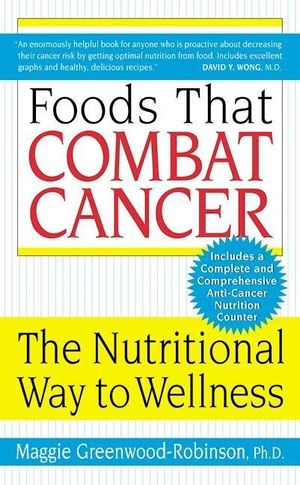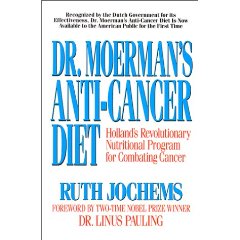Difference between revisions of "Cancer Diet"
(Created page with 'Unbelegte phantastische Behauptungen auf der ersten Seite der Bildzeitung<ref>Bildzeitung, erste Seite vom 28.1.2010</ref>|250px|thumb A '''cancer diet…') |
m |
||
| (23 intermediate revisions by 5 users not shown) | |||
| Line 1: | Line 1: | ||
| − | [[image:Krebskiller.jpg| | + | [[image:cancerdiet3.jpg|thumb]] |
| − | A '''cancer diet''' is a way of alimentation or diet intended to heal or cure a cancer disease in a causal way or to prolong survival time. A wider understanding of the term "cancer diet" includes | + | [[image:Krebskiller.jpg|Phantastic claims without reference on front page of German Bild-Zeitung<ref>Bild-Zeitung, first page January 28, 2010</ref>|200px|thumb]] |
| + | A '''cancer diet''' is a way of alimentation or diet intended to heal or cure a cancer disease in a causal way or to prolong survival time. A wider understanding of the term "cancer diet" also includes a diet intended to improve the quality of life of cancer patients without affecting prognosis. | ||
| − | So far, specific cancer diets are not accepted in scientific medicine, | + | So far, specific cancer diets are not accepted in scientific medicine, but are common in an environment of alternative medicine. However, most cancer patients also choose concomitant alternative therapies to an effective therapy in a complementary way. |
| − | Specific cancer diets are nutritional recommendations going beyond generic recommendations and include | + | Specific cancer diets are nutritional recommendations going beyond generic recommendations and usually include unusual components, for instance the consumption of herbal substances, or prohibit a particular way of alimentation or particular substances. The recommendations found (in books or the internet) as a rule are backed only by theoretical considerations and usually lack any scientific proof or literature. |
| − | In general, almost every cancer diet is claimed to be effective in a preventive way and at the same time also in a curative way. Cancer | + | In general, almost every cancer diet is claimed to be effective in a preventive way and, at the same time, also in a curative way. Cancer prevention and cure are often confused or mixed. However, a common cancer patient is much less interested in prevention of a possible future (different) cancer disease, but seeks healing or relief of his present state. Most cancer patients are aware that chemotherapy or radiation therapy may trigger a future cancer. |
| − | ==Common | + | ==Common Cancer Diet Models== |
| − | + | Common explanations for cancer diets are: | |
| − | |||
| − | |||
| − | |||
| − | |||
| − | + | *an alleged [[detoxification]] of usually not specified "toxins" or "waste" | |
| − | [[ | + | *strengthening of the immune system |
| − | * | + | *famishing of cancer cells (see [[Breuß cure]]) or selective intoxication of cancer cells |
| − | *[[Breuß | + | *recommendations in accordance with the [[Warburg effect]] of energy metabolism (examples: [[Budwig diet]] or [[Coy diet]]) |
| − | *[[ | ||
| − | |||
| − | |||
| − | |||
| − | |||
| − | |||
| − | |||
| − | |||
| − | |||
| − | |||
| − | |||
| − | |||
| − | |||
| − | |||
| − | == | + | ==Known Cancer Diets== |
| − | + | [[image:MoermanDiet.jpg|left|thumb]] | |
| + | *[[Anthroposophy|anthroposophic]] cancer diet according to Renzenbrink. A "whole foods" alimentation, without food originating from solanaceae (tomatoes, potatoes). Developed by German physician Udo Renzenbrink (1913-1994) | ||
| + | *[[Breuß cure]]: only vegetable juices (carrot, celery, potatoes, radishes) and particular teas for six weeks. Developed by Austrian farmer and "Heilpraktiker" (naturopath) Rudolf Breuß (1899-1990) | ||
| + | *[[Gerson diet]]: [[Coffee enema|coffee enemas]], laxatives, liver-extracts, iodine, vitamins and pepsine. Some proteins, sugar, and salt. | ||
| + | *[[Howard Hay diet]]: proteins and carbohydrates well separated. | ||
| + | *[[Instinctotherapy]] according to [[Guy Claude Burger]]: no cooked or heated food, but raw meat and fish is permitted. | ||
| + | *Isopathic lactic acid diet or protective diet according to [[Johannes Kuhl]]: optically (+) lactic acid. | ||
| + | *Cancer diet according to Ernst Leupold: extreme carbohydrate-deficient diet, infusions with sugar and insuline. No fruit (except for lemons). | ||
| + | *[[Macrobiotics|Macrobiotic diet according to Kushi-Ohsawa and his followers: mostly grains. | ||
| + | *[[Moerman diet]] according to Cornelius Moerman: "whole food" and iodine, citric acid, yeast, wheat, sulfur, and vitamins. | ||
| + | *[[Oil-protein diet]] according to [[Johanna Budwig]]: flax seed oils and nut oils, cabbage juice (Sauerkrautsaft), vegetable and fruit juices. | ||
| + | *Cancer diet according to [[Catherine Kousmine]]: grains and raw food, no meat. | ||
| + | *[[Hirneise 3E-program]]: developed by former nurse [[Lothar Hirneise]]. | ||
| + | *Whole Food diet according to Maximilian Bircher-Benner: Little fat, vegetables and grain in large quantities, milk products, fruit, fish instead of meat. | ||
| + | *[[Kelley Gonzalez therapy]]. | ||
| + | *[[Seeger 10 way therapy]]. | ||
| + | *[[Coy diet]] | ||
| − | + | ==Criticism== | |
| + | These various cancer diets are very different from each other and contradictory. Alleged preventive effects are often mixed with a possible curative approach. | ||
| − | == | + | No specific cancer diet has been accepted by evidence based medicine so far. To the contrary: a one-sided and limited diet (e.g. macrobiotics in its extreme form) may be harmful, cause nutritional deficits, and may increase weight loss. |
| + | |||
| + | {{OtherLang|ge=Krebsdiät|en=Cancer diet}} | ||
| + | |||
| + | ==Literature== | ||
#Kasper H, Bartram P, Scheppach W (1992) Tumorentstehung - hemmende und fördernde Effekte von Ernährungsfaktoren. In: Deutsche Gesellschaft für Ernährung (Hrsg) Ernährungsbericht 1992. Frankfurt: Eigenverlag, S. 251-286 | #Kasper H, Bartram P, Scheppach W (1992) Tumorentstehung - hemmende und fördernde Effekte von Ernährungsfaktoren. In: Deutsche Gesellschaft für Ernährung (Hrsg) Ernährungsbericht 1992. Frankfurt: Eigenverlag, S. 251-286 | ||
#Dötsch R (1994) Die Bewertung von Außenseitermethoden (”Krebsdiäten”) in der Onkologie. Akt Ernähr-Med 19: 322 | #Dötsch R (1994) Die Bewertung von Außenseitermethoden (”Krebsdiäten”) in der Onkologie. Akt Ernähr-Med 19: 322 | ||
| Line 54: | Line 58: | ||
*http://www.geocities.com/~ollenschlaeger/krebsdiat.pdf | *http://www.geocities.com/~ollenschlaeger/krebsdiat.pdf | ||
| − | == | + | ==References== |
<references/> | <references/> | ||
| + | ------------------------ | ||
| + | *[http://www.psiram.com/ge/index.php?title=Krebsdi%C3%A4t same article in German] | ||
| − | [[category: | + | [[category:Cancer Diet]] |
| − | [[category: | + | [[category:Pseudomedical Therapy]] |
Latest revision as of 16:33, 1 March 2013

A cancer diet is a way of alimentation or diet intended to heal or cure a cancer disease in a causal way or to prolong survival time. A wider understanding of the term "cancer diet" also includes a diet intended to improve the quality of life of cancer patients without affecting prognosis.
So far, specific cancer diets are not accepted in scientific medicine, but are common in an environment of alternative medicine. However, most cancer patients also choose concomitant alternative therapies to an effective therapy in a complementary way.
Specific cancer diets are nutritional recommendations going beyond generic recommendations and usually include unusual components, for instance the consumption of herbal substances, or prohibit a particular way of alimentation or particular substances. The recommendations found (in books or the internet) as a rule are backed only by theoretical considerations and usually lack any scientific proof or literature.
In general, almost every cancer diet is claimed to be effective in a preventive way and, at the same time, also in a curative way. Cancer prevention and cure are often confused or mixed. However, a common cancer patient is much less interested in prevention of a possible future (different) cancer disease, but seeks healing or relief of his present state. Most cancer patients are aware that chemotherapy or radiation therapy may trigger a future cancer.
Common Cancer Diet Models
Common explanations for cancer diets are:
- an alleged detoxification of usually not specified "toxins" or "waste"
- strengthening of the immune system
- famishing of cancer cells (see Breuß cure) or selective intoxication of cancer cells
- recommendations in accordance with the Warburg effect of energy metabolism (examples: Budwig diet or Coy diet)
Known Cancer Diets
- anthroposophic cancer diet according to Renzenbrink. A "whole foods" alimentation, without food originating from solanaceae (tomatoes, potatoes). Developed by German physician Udo Renzenbrink (1913-1994)
- Breuß cure: only vegetable juices (carrot, celery, potatoes, radishes) and particular teas for six weeks. Developed by Austrian farmer and "Heilpraktiker" (naturopath) Rudolf Breuß (1899-1990)
- Gerson diet: coffee enemas, laxatives, liver-extracts, iodine, vitamins and pepsine. Some proteins, sugar, and salt.
- Howard Hay diet: proteins and carbohydrates well separated.
- Instinctotherapy according to Guy Claude Burger: no cooked or heated food, but raw meat and fish is permitted.
- Isopathic lactic acid diet or protective diet according to Johannes Kuhl: optically (+) lactic acid.
- Cancer diet according to Ernst Leupold: extreme carbohydrate-deficient diet, infusions with sugar and insuline. No fruit (except for lemons).
- [[Macrobiotics|Macrobiotic diet according to Kushi-Ohsawa and his followers: mostly grains.
- Moerman diet according to Cornelius Moerman: "whole food" and iodine, citric acid, yeast, wheat, sulfur, and vitamins.
- Oil-protein diet according to Johanna Budwig: flax seed oils and nut oils, cabbage juice (Sauerkrautsaft), vegetable and fruit juices.
- Cancer diet according to Catherine Kousmine: grains and raw food, no meat.
- Hirneise 3E-program: developed by former nurse Lothar Hirneise.
- Whole Food diet according to Maximilian Bircher-Benner: Little fat, vegetables and grain in large quantities, milk products, fruit, fish instead of meat.
- Kelley Gonzalez therapy.
- Seeger 10 way therapy.
- Coy diet
Criticism
These various cancer diets are very different from each other and contradictory. Alleged preventive effects are often mixed with a possible curative approach.
No specific cancer diet has been accepted by evidence based medicine so far. To the contrary: a one-sided and limited diet (e.g. macrobiotics in its extreme form) may be harmful, cause nutritional deficits, and may increase weight loss.
Versions of this article in other languages
- Deutsch: Krebsdiät
Literature
- Kasper H, Bartram P, Scheppach W (1992) Tumorentstehung - hemmende und fördernde Effekte von Ernährungsfaktoren. In: Deutsche Gesellschaft für Ernährung (Hrsg) Ernährungsbericht 1992. Frankfurt: Eigenverlag, S. 251-286
- Dötsch R (1994) Die Bewertung von Außenseitermethoden (”Krebsdiäten”) in der Onkologie. Akt Ernähr-Med 19: 322
- Ollenschläger. Welchen Nutzen haben sogenannte "Krebsdiäten" ? Der informierte Arzt - Gazette Médicale 1996; 17: 213-220 [www.ollenschlaeger.net]
- Jungi WF (1986) Krebsdiäten. In: Jungi WF, Senn HJ (Hrsg) Krebs und Alternativmedizin. Aktuelle Onkologie, Bd. 32. München: Zuckschwerdt Verlag, S: 284-294
- Kasper H (1991) Tumordiät - Fakt oder Phantasie. In: Schauder P (Hrsg) Ernährung und Tumorerkrankungen. Basel: Karger, S. 440-453
- Halliwell B (1994) Free radicals, antioxidants and human disease: curiosity, cause, or consequence. Lancet 344: 721-724
- Bitsch R, Sinnhuber, Oberritter H, Großklaus R, Müller MJ, Wolfram G (1994) Alternative Diäten - Wunderdiäten? Akt Ernähr-Med 19: 195-211
- Birkhan B (1993) Unkonventionelle Konzepte in der Diätetik. In: Oepen I (Hrsg) Unkonventionelle medizinische Verfahren. Stuttgart: Gustav Fischer, S. 221-241
- Strube H (1995) Außenseiterdiäten. In: Biesalski HK et al (Hrsg) Ernährungsmedizin. Stuttgart: Thieme, S. 483-493
- Ollenschläger G, Thomas W, Konkol K, Diehl V, Roth E (1992) Nutritional behaviour and quality of life during oncological polychemotherapy: Results of a prospective study on the efficacy of oral nutrition
Weblinks
References
- ↑ Bild-Zeitung, first page January 28, 2010

